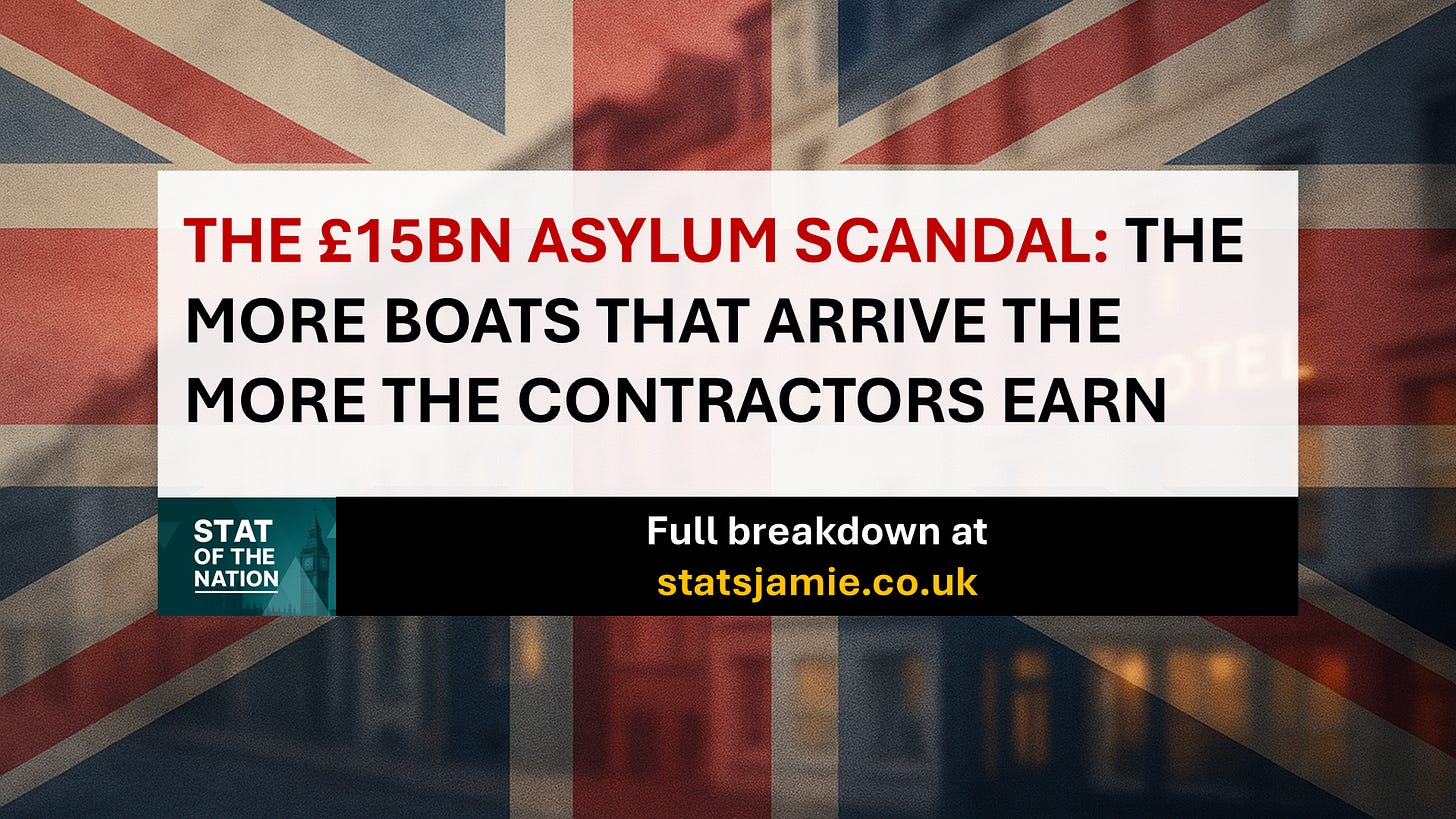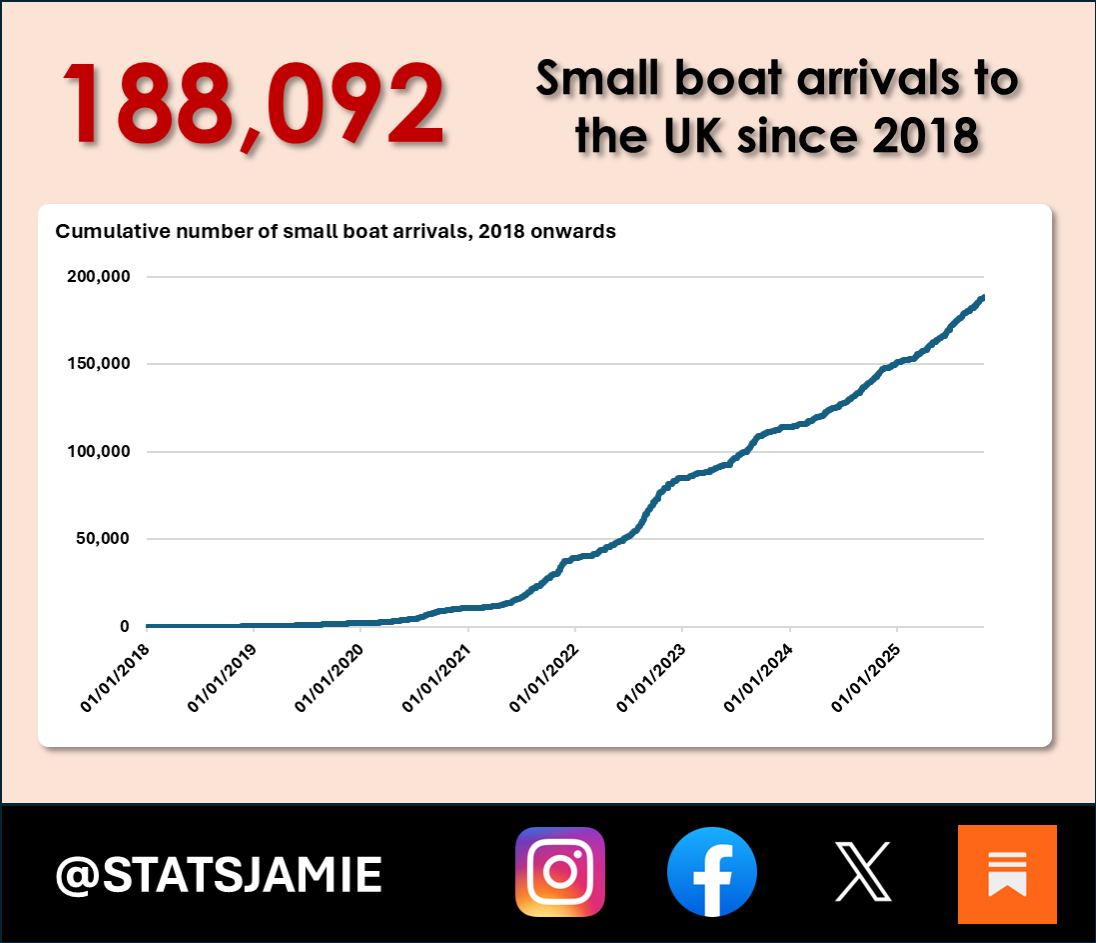The £15 Billion Asylum Scandal: The More Boats That Arrive, the More the Contractors Earn
A decade-long deal that turned a small-boat crisis into big business — billions in spending, record arrivals, and hundreds of millions in profit for the same three firms.
In 2018, just 299 people crossed the Channel in small boats. That’s all — not even three hundred.
Yet only a few months later, in January 2019, the Home Office signed a decade-long contract package worth £4.5 billion, handing control of asylum housing to three private firms — Serco, Mears and Clearsprings.
Six years on, the bill has tripled to more than £15 billion, and the system that was supposed to manage migration has become one that profits from it.
While ministers promised to stop the boats, the numbers — and the costs — have exploded.
🚤 From Hundreds to Tens of Thousands
In 2019, the year those contracts were announced, small-boat arrivals rose from 299 to 1,843 — a sixfold increase. By 2020, the figure had climbed again to 8,466.
Then came the surge: 28,526 in 2021, 45,755 in 2022, and around 37,000 last year.
Now, under Keir Starmer, the trend is rising again — despite the £700 million already handed to France to “stop the boats.”
👉 See my latest analysis: £700 Million to France — and 188,000 Small-Boat Arrivals in Return.
The pattern couldn’t be clearer: once those ten-year contracts were in place, the crossings — and the costs — exploded. A system that was meant to manage migration turned into one that profits from it.
💷 The 10-Year Deal That Went Sideways
In January 2019, the Home Office awarded seven regional Asylum Accommodation and Support Contracts (AASCs) to just three firms — Serco, Mears Group and Clearsprings Ready Homes.
Together, the deals were worth £4.5 billion over a ten-year period (2019–2029). Payments were volume-based: each extra person housed meant more money.
That meant no risk for the companies if arrivals surged. When the boats kept coming, the taxpayers’ bill simply grew.
By 2025, the projected cost had ballooned to £15.3 billion — more than triple the original price tag.
“If success means fewer arrivals, why design a system that pays more when the problem gets worse?”
🏨 The Hotel Habit
Hotels were meant to be temporary — a stopgap while longer-term housing was found.
Instead, they became the backbone of the system.
In 2023–24, the Home Office spent £4.7 billion on asylum support, and an astonishing £3.1 billion of that went on hotels.
At the 2023 peak, over 400 hotels across the UK were in use; even now, around 32,000 people remain in them.
According to analysis by the Migration Observatory at the University of Oxford, the average daily cost of housing an asylum seeker in a hotel in 2024/25 is estimated at £170 per person, compared to just £27 for other forms of accommodation — over six times more expensive.
The uncomfortable truth is that housing asylum seekers in hotels is far more lucrative than placing them in homes. The longer the hotel system runs, the better the providers’ balance sheets look.
Yet there’s a trade-off. Using hotels does mean less direct pressure on local housing, avoiding the political flashpoints that come with taking properties out of the rental market.
But ultimately, what the public wants isn’t a debate over where to house record numbers of arrivals — it’s fewer arrivals altogether.
Until that changes, the government will keep spending billions managing the symptoms rather than fixing the cause.
🏘 The Hidden Cost of “Dispersal”
Moving everyone into community housing looks cheaper on paper, but it brings its own pressures.
Tens of thousands of asylum seekers are placed in towns already facing housing shortages. Contractors offering guaranteed long-term rents to private landlords — often outbidding local families.
It saves money from Whitehall’s perspective, but shifts the burden onto local communities. Six times cheaper than hotels — but more visible in neighbourhoods already struggling for homes.
📈 Profits Without Performance
Despite missed targets and well-documented failures, enforcement has been minimal. Since 2019, the Home Office has deducted only £4 million in performance penalties — on contracts worth fifteen billion.
The profits generated under these conditions have been substantial. A detailed breakdown published by the National Audit Office revealed that the three main providers — Clearsprings, Serco, and Mears — generated a combined total profit of £383 million from these contracts between September 2019 and August 2024.
Two of the firms — Clearsprings and Mears — even exceeded their agreed profit caps, owing a combined £46 million back to the Home Office, which still hasn’t been recovered. Some contracts delivered margins of up to 17 per cent, with average returns around 7 per cent — far higher than normal public-service outsourcing.
Performance failures went unpunished — but profits soared. For all the talk of broken borders, it’s the balance sheets that are booming.
🕰 A Decade Later, the Bill Keeps Growing
More than six years on, the same firms still hold the keys to Britain’s asylum system.
The contracts run until 2029, and despite all the promises to “end hotel use,” thousands remain in them.
Billions have been poured into accommodation rather than prevention, while the small-boat numbers rise again and the public’s patience wears thin.
This was never just about migration; it’s about money, management, and misaligned incentives. A decade-long policy failure where the only people guaranteed a safe landing were the contractors.
We were told this was about control. In truth, it’s about contracts — and who’s cashing them.
✍️ Jamie Jenkins (hit subscribe - it’s free)
📚 If you found this useful, you might also want to read:
👉 Dr Hilary Leaves ITV — Years After Peddling False COVID Claims on Air — he claimed 90% of COVID patients were unvaccinated — the real figure was 36%. Now, years later, he’s off air as viewers switch off too.
Stat of the Nation exists to cut through the spin and show the numbers as they are.
If you value clear, fact-driven analysis — please share this roundup with others. And hit subscribe below to get the stats first, every time.
📲 Follow me here for more daily updates:



